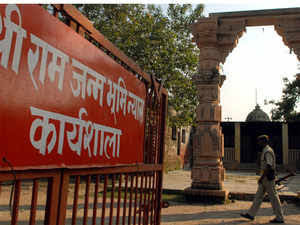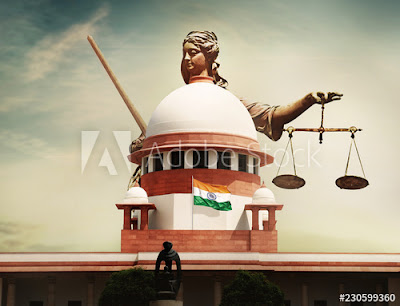Ayodhya Hearing: SC concludes daily hearings in 40 days
Ayodhya Hearing: SC concludes daily hearings in 40 days
JAYA SINGH
BACKGROUND
The Ram Janmbhoomi-Babri Masjid case is centred on a controversial piece of land in the Ayodhya, Uttar Pradesh where Lord Ram was born. The flagship between Hindu and Muslim community dates back to 1528 when a mosque was built on the site which the Hindu community claimed as the Ramjanmbhoomi. Mir Baki, one of Mughal King Babur’s generals was said to have demolished a temple of Rama which already existed at the disputed site and constructed a mosque instead naming it Babri Masjid. Hindus allegedly placed Lord Ram’s idols inside the mosque which led to communal riots and both the parties filing suits. The government proclaimed the site a disputed area and locked the gates. Vishwa Hindu Parishad party spearheaded a committee to build the deity’s temple at the disputed land.
BJP leader Lal Krishna Advani takes charge of the campaign. The Hindu Karsevaks and supporters of VHP, the Shiv Sena Party and the demolished the Babri Masjid leading to nationwide communal riots between the Hindus and Muslims. In 2002, the then Prime Minister Atal Bihari Vajpayee had set up an Ayodhya cell in his office and designated a senior official to hold talks with Hindu and Muslim leaders. The Archaeological Survey of India began a court-ordered survey to find out whether a Ram temple existed at the disputed site and found evidence of a temple which Muslims objected to. In 2009, Liberhan commission submitted its report in the parliament blaming BJP’S active role in Babri Masjid’s demolition.
In 2010, Allahabad High Court decreed division and transfer of title in three equal parts of the 2.77 acres of the disputed land to three principal parties, one three to each Muslims, Hindus and the Nirmohi Akhra sect. However, Hindus got the main disputed section of the land which Muslims objected to and filed an appeal against in the court of law. In 2018, The Supreme Court directed to hear the matter on January 2019. The five-judge constitutional bench by Chief Justice Ranjan Gogoi heard the matter and advocated an amicable resolution to the Ram Mandir case through mediation.
CURRENT ISSUE (SC concludes daily hearings in 40 days)
SC concludes daily hearings in 40 days after a marathon of arguments and reserved the judgment with a written note is to be submitted in the next three days. The Supreme Court bench hearing the case will sit in chambers on 17.10.2019 and a closed-door proceeding is likely on the cards to discuss the mediation panel report. The judges will take a call whether the content of the report requires to be disclosed in the open court. Fourteen appeals have filed in the apex court against the 2010 Allahabad High Court Judgment.
- The bench comprising CJI Ranjan Gogoi, Justice Bobde, Justice Chandrachud, Ashok Bhushan and Abdul Nazeer extensively heard Senior Advocate K Parasaran and C S Vaidyanathan (for the deity ram Lalla), S K Jain (for Nirmohi Akhara), Rajeev Dhavan along with Meenakshi Arora and Shekhar Naphade (for Sunni Waqf Board and Muslim parties) and few other lawyers.
- The day to day hearing commenced on August 6, after CJI declared the mediation talks by the SC-appointed panel of Justice F M Khalifullah, Sri Sri Ravi Shankar and Senior Advocate Sriram Panchu failed.
- The parties have referred to the report of historians, travellers and gazetteers and land documents prepared during British rule to base their respective claims. References were also made to the report of the Archaeological Survey of India on the point whether the mosque was built over an existing temple.
- “If the Hindus are claiming the title before 1885, we are entitled to it by the virtue of adverse possession for 2 centuries. The premises are ours. What was destroyed belonged to us? We are entitled to restoration. We had sought the relief of restitution. The bricks are still there….The property belongs to the Waqf….We are claiming the whole area as being part of the mosque, including the Chabutra…….And we are not praying for the title alone. The declaration is for a public waqf”, Senior Advocate Rajeev Dhavan argued.
- Advocate Dhavan further added to his contention that the Nirmohi Akhara was only acting in the capacity of the ‘pujari’ and not the ‘shebait’. He also questioned the credentials of the Hindu Mahasabha, pointing out that it has branched out the several entities – “There are four replies of the Mahasabha. And the four replies are contradicting. Which Mahasabha is being represented?”
CONCLUSION
The final day of the hearing witnessed some dramatic moments with Dr Dhavan tearing up in court certain maps and other documents sought to be relied on by Senior Advocate Vikas Singh to show the point which the Hindus have believed to be Lord Ram’s birthplace. He subsequently suggested that he had intended to throw away the papers and proceeded to tear them only after Chief Justice said to which he nodded in affirmation. The case marks the second-longest hearing in the history of Supreme Court after the landmark hearing in Keshavnanda Bharti case which lasted for 68 days and the Aadhar case hearing took 38 days. The verdict in the case can be expected before November 17, the date of retirement of CJI Gogoi, who heads the bench.
ALSO READ: PLEA CHALLENGING HAFIZ SAEED’S ARREST




Comments
Post a Comment